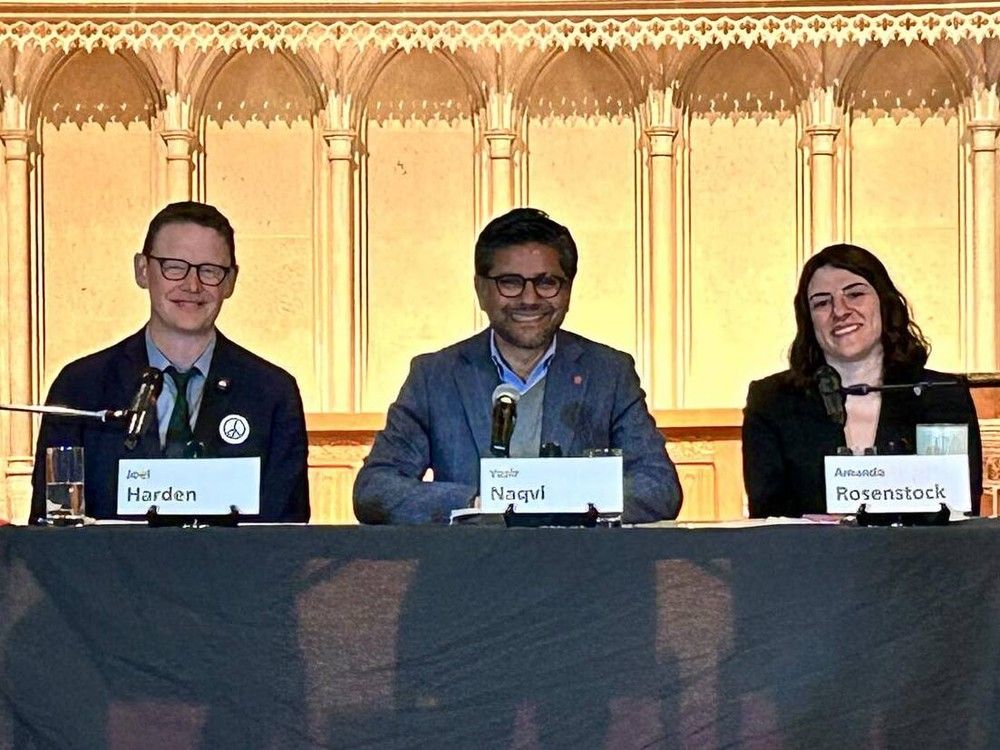Ottawa Centre voters packed into the Knox Presbyterian Church in Centretown on Tuesday night expecting a debate between four candidates, but only heard from three.
The debate was organized by local community associations and hosted by David Reevely, an Ottawa correspondent for the Logic and former Ottawa Citizen reporter.
He said Conservative candidate Paul D’Orsonnens had agreed to participate, but he “pulled out at the very last moment,” leaving voters to hear from NDP candidate Joel Harden, Liberal candidate Yasir Naqvi and Green candidate Amanda Rosenstock.
Here are six things you need to know from the debate.
Fixing the housing crisis
When asked about the housing crisis, all candidates agreed more homes needs to be built.
Rosenstock said the city’s official plan emphasizes “missing middle housing” as a solution to providing both renters and first time home buyers with more options that can accommodate their needs. That includes row houses, duplexes, townhouses, and anything in between a single-detached home and a large apartment building.
Harden said the emphasis should be on expanding the work of non-market housing providers, like co-ops and non-profits already established in Ottawa, to build affordable housing.
“The failure is to believe the private sector will do this with government support,” he said.
Naqvi said, in his time as MP for Ottawa Centre, he garnered more than $1 billion in federal funding to build more than 3,000 homes.
Should public servants work downtown?
As Ottawa’s downtown core has struggled with a reduced presence of public servants since the COVID-19 pandemic, candidates were asked about the federal government’s role in getting workers back downtown. (Since September, the federal government has required many public servants to work in offices at least three days a week.)
Naqvi said hybrid work is “here to stay,” and there should be a “happy middle,” depending on specific job roles and tasks. He said he convened a task force that aims to get more people to live, work and visit downtown, saying the core was struggling even before the pandemic.
Harden said the current three-day requirement was “ham-fisted,” and said telework is good for the planet and productivity.
“There are too many people commuting across the city, leaving their home office which was funded by the public service, to sit in a mouldy building and speak to an Indigenous community on Teams,” he said.
Roenstock said there was a lack of consultation with public sector unions, and the public service valued hybrid work for its flexibility and enhanced wellbeing among workers.
Funding for local transit
Operational costs for transit systems are typically paid for by municipalities, with the federal government kicking in for big capital projects, such as building Ottawa’s LRT lines.
When asked if the federal government should pick up the tab for OC Transpo’s operational costs, Naqvi noted that the feds funded $375 million to replace Ottawa’s diesel buses with an electric fleet, and also promised $180 million over 10 years for capital costs, essentially freeing up that money in the city’s budget to pay for operational costs.
Rosenstock, who by day is a policy analyst focused on sustainable transportation, said federal funding should rely on municipalities having a plan to grow its transit ridership year over year. While the federal government provides funding for capital expenses, “if we can’t pay bus drivers to drive those buses, or the mechanics to repair an aging fleet, what good is giving municipalities capital money?” she said.
Harden cited
a study that called for municipalities to double their transit usage by 2035,
which is the equivalent of taking 20 million cars off the road.
“The only way to do that is for the federal government to fund public transit,” he said.
Standing up to Trump
The candidates were asked how they would deal with the U.S. President Donald Trump and his threatening behaviour towards Canada.
Rosenstock said Canada “has to be tough,” base our negotiations on facts and focus on what’s best for Canada, advancing Canadian interests and growing our economy.
“With a bully, one needs to project strength,” Harden said. “But Canadians are strong, and we’re seeking out new dance partners.” He said the creation of a “fentanyl czar” gave credence to Trump’s claims that the drug was flowing from Canada into the U.S., when in reality, a very small amount of fentanyl seized at the American border comes from this country.
Naqvi said dealing with Trump involves outlining non-negotiables, saying it’s “carved in stone” that Canada not become the 51st state of the U.S. He said tariffs should be fought back dollar-for-dollar.
“If he’s going to cause pain to our workers and (businesses), there’s costs to his economy,” he said, adding Canada is seeking “new friends” in global trade.
Let’s drop the puck downtown
All three candidates agreed the Ottawa Senators should play in a new arena at LeBreton Flats.
Harden, though, said “sports can’t drain the public purse,” and there needs to be a community benefits agreement in place to protect affordability.
Rosenstock agreed, saying the current Kanata arena is inaccessible to many, and said a new facility at LeBreton Flats could bring more housing and investment to the area.
Naqvi said he’d been working on the file with the National Capital Commission, which owns the land, and said it’s an “amazing opportunity to build an area that is inclusive.”
Our website is your destination for up-to-the-minute news, so make sure to bookmark our homepage and sign up for our newsletters so we can keep you informed.
Related
- Where Ottawa Centre candidates stand on housing, public service, crime and more
- Federal election 2025: Everything you need to know about voting in Ottawa Centre



